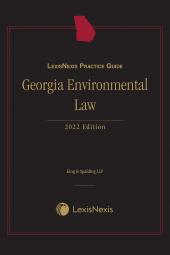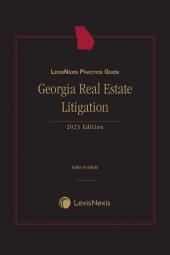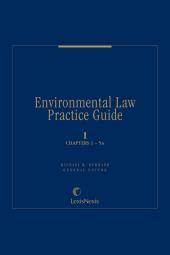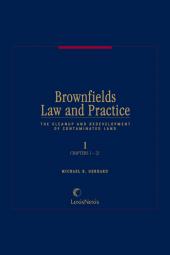LexisNexis Practice Guide: Georgia Environmental Law
Select a format
 International Order Inquiry
International Order Inquiry
Select subscription type
Terms & conditions
Subscribers receive the product(s) listed on the Order Form and any Updates made available during the annual subscription period. Shipping and handling fees are not included in the annual price.
Subscribers are advised of the number of Updates that were made to the particular publication the prior year. The number of Updates may vary due to developments in the law and other publishing issues, but subscribers may use this as a rough estimate of future shipments. Subscribers may call Customer Support at 800-833-9844 for additional information.
Subscribers may cancel this subscription by: calling Customer Support at 800-833-9844; emailing customer.support@lexisnexis.com; or returning the invoice marked "CANCEL".
If subscribers cancel within 30 days after the product is ordered or received and return the product at their expense, then they will receive a full credit of the price for the annual subscription.
If subscribers cancel between 31 and 60 days after the invoice date and return the product at their expense, then they will receive a 5/6th credit of the price for the annual subscription. No credit will be given for cancellations more than 60 days after the invoice date. To receive any credit, subscriber must return all product(s) shipped during the year at their expense within the applicable cancellation period listed above.
The total price includes the product(s) listed in the Order Form and any Updates for a limited period (minimum period of 30 days) after the order is placed ("Order Window"). Shipping and handling fees are not included in the grand total price.
All shipments may be returned, at subscribers' expense, for full credit of the Price within 30 days of receipt.
Shipments may not be returned, and no credits will be issued, more than 30 days after receipt.
After the Order Window, subscribers will receive notice of Updates along with the then-current grand total price and order process as Updates become available. Subscribers will only be shipped those Updates they specifically request.
Product description
View a sample of this title using the ReadNow feature
LexisNexis Practice Guide: Georgia Environmental Law provides a handy, authoritative reference to both Georgia's environmental laws and the state's regulatory obligation to comply with applicable federal laws. This book is a collaborative effort of King & Spalding LLP's Environmental, Health and Safety practice, whose attorneys have decades of experience advising clients on a wide range of environmental and safety issues across all media. The group includes lawyers with technical backgrounds—engineering, chemistry, biology, land use, environmental policy and safety—who function well at the intersection of law and science, present issues in plain English, and work to find practical solutions to complex problems.
The 2021 edition ISBN is 9781663308276.
eBooks, CDs, downloadable content, and software purchases are noncancelable, nonrefundable and nonreturnable. Click here for more information about LexisNexis eBooks. The eBook versions of this title may feature links to Lexis+® for further legal research options. A valid subscription to Lexis+® is required to access this content.
Table of contents
CHAPTER 1 ADMINISTRATIVE PROCEDURE
PART I: CHAPTER OVERVIEW
§ 1.01 Scope
§ 1.02 Administrative Procedure Overview
PART II: ADMINISTRATIVE APPEALS
§ 1.03 Decisions Subject to Administrative Appeals
§ 1.04 Initiation of an Administrative Appeal
§ 1.05 Administrative Hearings Conducted by the Office of State Administrative Hearings
§ 1.06 Standing to Bring an Administrative Appeal
§ 1.07 Automatic Stay of Certain Permits
§ 1.08 Administrative Appeal Procedures
PART III: APPEALS FROM OSHA DECISIONS
§ 1.09 Superior Court
§ 1.10 Court of Appeals
§ 1.11 Supreme Court
CHAPTER 2 AIR QUALITY CONTROL
PART I: CHAPTER OVERVIEW
§ 2.01 Scope
§ 2.02 Air Quality Control Overview
§ 2.03 Georgia Air Quality Act
PART II: STATIONARY SOURCES
§ 2.04 Emissions and Performance Standards
§ 2.05 General Permit Information
§ 2.06 New Source Review
§ 2.07 New Source Performance Standards
§ 2.08 Hazardous Air Pollutants
§ 2.09 Title V Operating Permits
§ 2.10 State SIP Permit Program
PART III: MOBILE SOURCES
§ 2.11 Overview
§ 2.12 Federal Preemption of State Authority to Regulate
§ 2.13 State Transportation Conformity Plan
§ 2.14 Motor Vehicle Emission Inspection and Maintenance
PART IV: ENFORCEMENT
§ 2.15 Overview
§ 2.16 Federal Enforcement
§ 2.17 State Enforcement
PART V: APPEALS
CHAPTER 3 SOLID WASTE
PART I: CHAPTER OVERVIEW
§ 3.01 Scope
§ 3.02 Overview
PART II: PERMITTING LANDFILLS AND OTHER FACILITIES
§ 3.03 Solid Waste Permit Requirement Generally
§ 3.04 Permit Application Process
§ 3.05 Permit Issuance or Denial
§ 3.06 Permit Modification or Revocation
§ 3.07 Permit Transfer
PART III: LANDFILL OPERATIONS
§ 3.08 Landfill Operations Regulation Generally
§ 3.09 Collection and Transportation Requirements
§ 3.10 Regulation of Receipt of Waste
§ 3.11 Regulations Regarding Protection of Air, Land and Water
§ 3.12 Regulations Regarding Safety and Access
§ 3.13 Cover Regulations
§ 3.14 Record Keeping and Reporting Requirements
PART IV: LANDFILL CLOSURE
§ 3.15 Closure Criteria
§ 3.16 Post-Closure Care
PART V: FINANCIAL ASSURANCE
§ 3.17 Financial Assurance Requirements and Mechanisms Generally
§ 3.18 Financial Assurance for Closure
§ 3.19 Financial Assurance for Post-Closure Care
§ 3.20 Financial Assurance for Corrective Action
PART VI: ENFORCEMENT
§ 3.21 Enforcement of Hazardous Waste Laws and Regulations
CHAPTER 4 HAZARDOUS WASTE
PART I: CHAPTER OVERVIEW
§ 4.01 Scope
§ 4.02 Overview
PART II: JURISDICTION OVER HAZARDOUS WASTE
§ 4.03 Identifying Hazardous Waste
PART III: GENERATORS OF HAZARDOUS WASTE
§ 4.04 General Requirements for Generators of Hazardous Waste
§ 4.05 Manifests for Tracking Hazardous Waste from Generators
§ 4.06 Pre-transport Requirements for Hazardous Waste from Generators
§ 4.07 Recordkeeping for Generators of Hazardous Waste
§ 4.08 Imports and Exports of Hazardous Waste
PART IV: TREATMENT, STORAGE, AND DISPOSAL OF HAZARDOUS WASTE
§ 4.09 General Requirements for Hazardous Waste Treatment, Storage, and Disposal Facilities
§ 4.10 Standards for Hazardous Waste Treatment, Storage, and Disposal Facilities
§ 4.11 Groundwater Protection Procedures for Hazardous Waste Treatment, Storage, and Disposal Facilities
§ 4.12 Closure and Post-Closure Requirements for Hazardous Waste Treatment, Storage and Disposal Facilities
§ 4.13 Corrective Action at Permitted Facilities
§ 4.14 Financial Assurance for Hazardous Waste Treatment, Storage and Disposal Facilities
PART V: PERMITS FOR HAZARDOUS WASTE FACILITIES
§ 4.15 Application for Permit for Hazardous Waste Treatment, Storage, and Disposal Facilities
§ 4.16 Administrative Procedures
§ 4.17 Permit Conditions
§ 4.18 Duration of Hazardous Waste Facility Permits
§ 4.19 Modification, Withdrawal, Revocation of Hazardous Waste Facility Permits
PART VI: TRANSPORTATION OF HAZARDOUS WASTE
§ 4.20 General Requirements for Transporters of Hazardous Waste
§ 4.21 Manifests for Transportation of Hazardous Waste
§ 4.22 Discharge of Hazardous Waste During Transport
PART VII: ENFORCEMENT OF HAZARDOUS WASTE LAWS AND REGULATIONS
§ 4.23 Enforcement of Hazardous Waste Laws and Regulations
CHAPTER 5 CONTAMINATED SITES
PART I: CHAPTER OVERVIEW
§ 5.01 Scope
§ 5.02 Contaminated Site Overview
PART II: HAZARDOUS SITE RESPONSE ACT O.C.G.A. §
§ 12-8-90 TO 12-8-97
§ 5.03 Scope
§ 5.04 Site Identification
§ 5.05 Corrective Action
§ 5.06 Liability
PART III: VOLUNTARY REMEDIATION PROGRAM ACT O.C.G.A. §
§ 12-8-100 TO 12-8-108
§ 5.07 Scope
§ 5.08 Application Process
§ 5.09 Remediation Process
§ 5.10 Benefits of the VRP
PART IV: HAZARDOUS SITE REUSE AND REDEVELOPMENT ACT, O.C.G.A. §
§ 12-8-200 TO 12-8-211
§ 5.11 Scope
§ 5.12 Application Process
§ 5.13 Remediation Process
§ 5.14 Limitation of Liability
PART V: SUMMARY
CHAPTER 6 GEORGIA WATER LAW
PART I: CHAPTER OVERVIEW
§ 6.01 Scope
§ 6.02 Water Law Overview
PART II: COMMON LAW RIPARIAN RIGHTS IN GEORGIA
§ 6.03 Overview of Georgia Riparian Water Law
§ 6.04 Reasonable Use
§ 6.05 Other Sticks in the Bundle of Riparian Rights
§ 6.06 1863 Statutory Codification of Common Law Principles
§ 6.07 Classification of Waterbodies
§ 6.08 Rights in Non-Tidal, Non-Navigable Rivers and Streams
§ 6.09 Rights in Non-Tidal, Navigable Rivers and Streams
§ 6.10 Rights in Lakes and Ponds
§ 6.11 Rights to Groundwater
PART III: REGULATION OF SURFACE WATER WITHDRAWALS
§ 6.12 Policy
§ 6.13 Permit Requirement; Thresholds and Exceptions
§ 6.14 Permit Application
§ 6.15 Usage Limits, Decision Criteria & Permit Conditions
§ 6.16 Permit Term, Duration, Transferability
§ 6.17 Modification, Suspension, or Revocation of Permits
§ 6.18 Emergency Orders During Emergency Periods of Water Shortage
§ 6.19 Judicial review
PART IV: REGULATION OF GROUNDWATER WITHDRAWALS
§ 6.20 Overview
§ 6.21 Policy
§ 6.22 Intersection between the Common Law Rule of Absolute Ownership and the Ground-water Use Act
§ 6.23 Permit Requirement; Thresholds and Exceptions
§ 6.24 Permit Application
§ 6.25 Usage Limits; Decision Criteria
§ 6.26 Permit Conditions
§ 6.27 Permit Term, Duration and Transferability
§ 6.28 Permit Modifications by Director
§ 6.29 Emergency Powers During Emergency Situations
§ 6.30 Enforcement and Judicial Review
PART V: DROUGHT RESTRICTION
§ 6.31 Overview
§ 6.32 Pre-Drought Restrictions on Outdoor Water Use
§ 6.33 Drought Indicators and Triggers
§ 6.34 More Stringent Outdoor Water Use Restrictions Prohibited
§ 6.35 Variance Requests
§ 6.36 Judicial Review
PART VI: WATER PLANNING IN GEORGIA
§ 6.37 Georgia’s Comprehensive State-wide Water Plan
CHAPTER 7 REGULATION OF WATER QUALITY
PART I: CHAPTER OVERVIEW
§ 7.01 Scope
§ 7.02 Overview
PART II: REGULATION OF DISCHARGES FROM POINT SOURCES
§ 7.03 Development of Water Quality Regulation
§ 7.04 Water Quality Standards
§ 7.05 Prohibition on Discharges of Pollutants
§ 7.06 The NPDES Permit System
§ 7.07 General Permits
§ 7.08 Individual Permits
§ 7.09 Publication and Review of Georgia EPD’s Permitting Decision
§ 7.10 Administrative and Judicial Review of NPDES Permitting Decisions
§ 7.11 The Permit Shield
§ 7.12 Total Maximum Daily Loads (TMDLs) and Impaired Waters
§ 7.13 Pretreatment Programs
§ 7.14 Enforcement
§ 7.15 Special Considerations for Municipal Dischargers and Publicly Owned Treatment Works
PART III: SECTION 404 PERMITTING
§ 7.16 In General
§ 7.17 Section 404 Permits in Georgia
PART IV: REGULATION OF STORMWATER
§ 7.18 NPDES Permit Requirement
§ 7.19 Permit Subject to Public Notice and Comment Process
§ 7.20 Prohibited Discharges
§ 7.21 Permits for Municipal Separate Storm Sewer Systems (“MS4”)
§ 7.22 General Permit for Construction Activities
§ 7.23 General Permit for Industrial Activities
§ 7.24 Enforcement
PART V: STORMWATER COMMON LAW ISSUES
§ 7.25 Overview
§ 7.26 Nuisance and Trespass
§ 7.27 Negligence and Negligence Per Se
§ 7.28 Statute of Limitations
§ 7.29 Causation and Damages
§ 7.30 Punitive Damages
PART VI: EROSION AND SEDIMENTATION CONTROL
§ 7.31 Erosion and Sedimentation Control Overview
§ 7.32 Stream Buffers
CHAPTER 8 LAND USE
PART I: CHAPTER OVERVIEW
§ 8.01 Scope
§ 8.02 Land Use Overview
PART II: ZONING
§ 8.03 Delegated Authority to Local Government
§ 8.04 Process for Zoning and Rezoning
§ 8.05 Judicial Review of a Zoning Decision
§ 8.06 Exception for Prior Nonconforming Use
§ 8.07 Conditional Zoning
§ 8.08 Discriminatory Zoning
§ 8.09 Spot Zoning
§ 8.10 Variance
§ 8.11 Special Use Permit
§ 8.12 Special Disclosures and Conflicts of Interest in Rezoning Decisions
PART III: PLANNING
§ 8.13 Georgia Department of Community Affairs
§ 8.14 Impact of Comprehensive Planning on Zoning Decisions
CHAPTER 9 MANAGING STORAGE TANKS
PART I: CHAPTER OVERVIEW
§ 9.01 Scope
§ 9.02 Managing Storage Tanks Overview
PART II: UNDERGROUND STORAGE TANKS
§ 9.03 Federal Regulation of Storage Tanks
§ 9.04 Delegation of Federal Programs to Georgia
§ 9.05 Georgia Underground Storage Tank Act
§ 9.06 Rulemaking
§ 9.07 Authority of Georgia Environmental Protection Division
§ 9.08 “Tank” Defined
§ 9.09 Design and Construction Requirements
§ 9.10 Permit and Notification Requirements
§ 9.11 Operation Requirements
§ 9.12 Periodic Testing and Inspections
§ 9.13 Recordkeeping
§ 9.14 Release Detection
§ 9.15 Leak and Spill Reporting
§ 9.16 Investigation of Off-Site Impacts
§ 9.17 Leak and Spill Response Requirements
§ 9.18 Corrective Action Plans
§ 9.19 Financial Assurance
§ 9.20 Required Financial Assurance Amounts
§ 9.21 Financial Assurance Reporting and Recordkeeping
§ 9.22 GUST Trust Fund
§ 9.23 Closure Requirements
§ 9.24 Cost Recovery
§ 9.25 Emergency Orders
§ 9.26 Enforcement
§ 9.27 Administrative Appeals
§ 9.28 Variances
§ 9.29 Operator Requirements
§ 9.30 Training Requirements
PART III: ABOVEGROUND STORAGE TANKS
§ 9.31 Policy and Authority
§ 9.32 Adoption of National Fire Protection Association Standards
§ 9.33 Design and Construction Requirements
§ 9.34 Reporting of Fires and Incidents
CHAPTER 10 COASTAL DEVELOPMENT
PART I: CHAPTER OVERVIEW
§ 10.01 Scope
§ 10.02 Coastal Development Overview
PART II: COASTAL ZONE MANAGEMENT
§ 10.03 Georgia Coastal Management Act
PART III: COASTAL MARSHLANDS PROTECTION ACT
§ 10.04 Coastal Marshlands Protection Act
§ 10.05 Jurisdiction of Coastal Marshlands Protection Act
§ 10.06 Permit Requirement, Minor Alterations, and Letters of Permission
§ 10.07 Permit Exemptions
§ 10.08 Permitting Under the Coastal Marshlands Protection Act
§ 10.09 Enforcement
PART IV: BEACH AND SHORE PROTECTION
§ 10.10 Shore Protection Act
§ 10.11 Jurisdiction of the Shore Protection Act
§ 10.12 Permit Requirement and Permit Issuance
§ 10.13 Permit Exemptions
§ 10.14 Permitting Under the Shore Protection Act
§ 10.15 Enforcement
PART V: REVOCABLE LICENSE TO ENCROACH ON STATE-OWNED WATERBOTTOMS
§ 10.16 Revocable License Requirement
PART VI: CHECKLIST
§ 10.17 CHECKLIST: Issues to Consider in the Coastal Development Process
 Lexis Nexis
Lexis Nexis 


